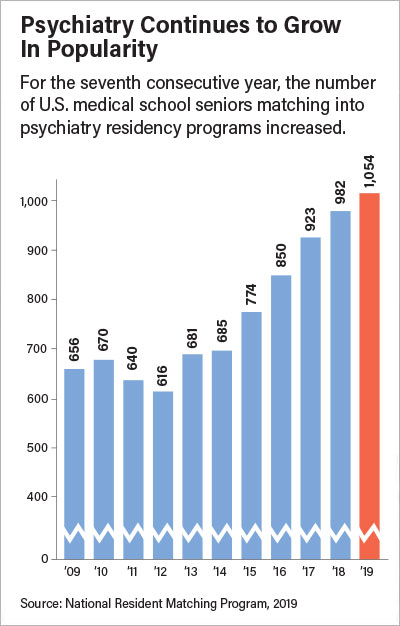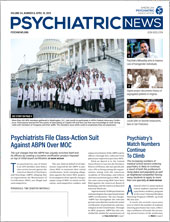A total of 1,054 U.S. senior medical school students matched with a psychiatry residency program in this year’s National Resident Matching Program (NRMP), up from 982 last year.
It marks the seventh consecutive year in which the number of students entering psychiatry has risen, reflecting a confluence of trends: the increasing attractiveness of the profession, the expansion of the Match, and mounting competitiveness for slots, causing some residents to apply in more than one specialty.
A total of 1,740 psychiatry residency positions were offered, of which 1,720 were filled. The 1,054 U.S. senior medical school graduates who filled those slots were joined by 666 U.S. and non-U.S. graduates of international medical schools as well as graduates of U.S. schools from previous years. (NRMP will provide a breakdown of non-U.S. seniors matching into specific specialties later this year.)
Psychiatry’s numbers have been on a generally upward trend from the 1990s, when the profession’s match numbers were in the 400s for much of the decade, with some waxing and waning in the mid-2000s.
But beginning in 2013, the match numbers for psychiatry began to climb steadily, with particularly dramatic increases in the last five years: a 12.9 percent increase in 2015 (774 matching seniors up from 685 the year before); a 9.8 percent increase in 2016 (850 matching seniors up from 774); an 8.5 percent increase in 2017 (923 matching seniors up from 850); a 6.3 percent increase last year (982 seniors up from 923); to this year’s number, which represents a 7.3 percent increase over last year (see chart).
The NRMP is a private, not-for-profit organization established in 1952 to provide “an orderly and fair mechanism” to match the preferences of applicants to U.S. residency positions with the preferences of residency program directors for those applicants. The NRMP is sponsored by the American Board of Medical Specialties, the AMA, the Association of American Medical Colleges, the American Hospital Association, and the Council of Medical Specialty Societies.
The match is watched closely by physician workforce experts as an indication of the specialties and subspecialties toward which young doctors are gravitating.
“The steady upward trend we are seeing over seven years shows that psychiatry’s profile among U.S. medical students has risen, a result in part of APA’s good efforts at recruitment and the integration of our profession with the rest of medicine,” said APA President Altha Stewart, M.D. “It’s good news for our profession and good news for our patients, although many areas of the country will continue to experience profound shortages of psychiatrists and mental health professionals.”
Former APA Trustee Sid Weissman, M.D., an educator and long-time observer of workforce trends, says the increasing match figures for psychiatry in recent years is due, at least in part, to higher numbers of medical students competing for residency slots whose availability has not kept pace with the demand.
“Senior medical students aware of the limited number of residency positions in sought-after specialties are considering more options as they plan their medical careers and heed the advice of their deans to apply to more than one specialty,” Weissman told Psychiatric News.”
Weissman noted that while interest in psychiatry has grown with the expansion of medical schools, interest in family medicine and primary care has only marginally kept pace. The number of seniors matching to family medicine residencies dropped slightly this year, from 1,628 to 1,601. Seniors matching in internal medicine increased, but the number for pediatrics dropped slightly, from 1,746 last year to 1,715 this year.
Weissman said he expects psychiatry to continue to do well into the 2020s.
According to the NRMP, the number of applicants participating in this year’s match is the largest in NRMP history. A record-high 38,376 applicants submitted program choices for 35,185 positions. The number of available first-year (PGY-1) positions rose to 32,194, an increase of 1,962 (6.5 percent) over 2018.
The number of U.S. citizen international medical school students and graduates (IMGs) who submitted program choices was 5,080, an increase of five over 2018; 59 percent (2,997) matched to PGY-1 positions, the highest match rate since 1991.
The number of non-U.S. citizen IMGs who participated in the match declined for the third consecutive year. However, 4,028 IMGs (58.6 percent) matched to first-year positions, which is 2.5 percentage points higher than 2018 and the highest match rate since 1990. ■
Data and charts pertaining to the 2019 match can be accessed
here.

